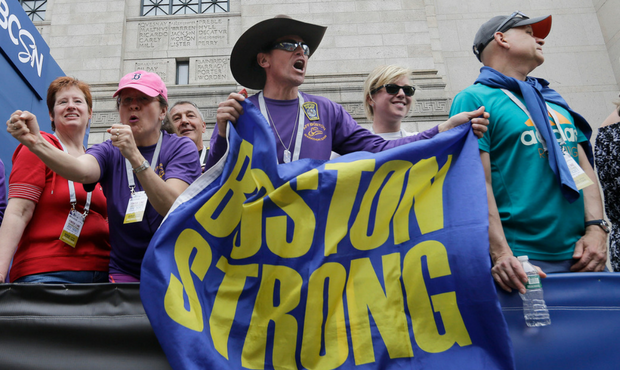
For many runners, running a Boston qualifying time is the ultimate running goal. It is, after all, one of the most revered courses in history and a badge of honor to earn your way in.
If you're lucky enough to gain a spot in the race, there are some things you should know. At every turn you'll face challenges, from the moment you attempt to BQ to the final steps over the finish line. Don't worry, it's totally worth it.
Running Events Near You
The Registration Process
The Boston Marathon has tough qualifying standards, and even if you run a BQ, there's no guarantee you'll get in. Each year, there are more qualified runners than available spots. For the 2018 race, runners had to be at least 3 minutes and 23 seconds faster than their age group qualifying standard to gain entry to the race. This left about 5,000 people who qualified and tried to register out of luck. Besides running a wicked fast time, what's a runner to do? Besides choosing a fast course to attempt your BQ, not much. But if you don't nab a bib through time qualification, the race has a few thousand charity spots, so that's always an option.
For reference, these are the Boston qualifying standards for 2018:
Age Men Women
18-34 3hrs 05min 00sec 3hrs 35min 00sec
35-39 3hrs 10min 00sec 3hrs 40min 00sec
40-44 3hrs 15min 00sec 3hrs 45min 00sec
45-49 3hrs 25min 00sec 3hrs 55min 00sec
50-54 3hrs 30min 00sec 4hrs 00min 00sec
55-59 3hrs 40min 00sec 4hrs 10min 00sec
60-64 3hrs 55min 00sec 4hrs 25min 00sec
65-69 4hrs 10min 00sec 4hrs 40min 00sec
70-74 4hrs 25min 00sec 4hrs 55min 00sec
75-79 4hrs 40min 00sec 5hrs 10min 00sec
80+ 4hrs 55min 00sec 5hrs 25min 00sec
More: The Best Marathons to Earn a BQ
New England's Fickle Weather
In the past few years, race day weather has ranged from 85 degrees and sunny to 45 degrees and rainy. Occasionally you'll get the perfectly cool day with a tailwind, but April weather is notoriously tricky in the Northeast. If you can, train in a variety of conditions and have a plan (and an outfit!) for rain, heat, wind, etc. And as you're stalking the 10-day forecast, remember that the weather can sometimes vary from the start in Hopkinton to the finish in coastal Boston.
The Late Start Time
There are four wave starts that go off between 10 a.m. and 11:15 a.m., so if you're used to early morning races, this can be a challenge. Acclimate yourself by doing most, if not all, of your long runs at your projected start time. This will help you figure out the right amount of fuel (and bathroom time) you'll need on race day.
Related: The Golden Rules of the Boston Marathon
The Early Miles
The start in Hopkinton is on a small rural road, and it can feel crowded. Resist the temptation to weave around fellow runners. The field will become less crowded soon. Additionally, there's a 130-foot drop in the first mile. You might feel good early on and consider banking time, but if you go out too fast, you'll pay for it in the second half of the race. Stick to your pacing plan, and conserve energy during the first half of the race.
The Newtown Hills
You've probably heard of Heartbreak Hill, a half-mile ascent near mile 20, but there are actually a series of four (!) hills stretching from miles 16-21. They vary in steepness and length, but at this point in the race, your legs will be tired, so mental preparation (and perhaps a good playlist) is your best defense. Keep the pace steady and stick to your fuel and hydration plan. You'll get a break from the hills in the final miles of the course.
$MG:0f56bd4-6a3f-45da-b6e6-0cd3fc5becaa$Cemetery Mile
You've conquered the Newton hills. Smooth sailing to the finish, right? Not so fast. Mile 22 to 23 is often called cemetery mile, aptly named after the cemetery on the left, but also after the state of runners' legs. After over 20 miles of pounding the steep descent in this mile can do a number on your quads. Try to take short, quick steps to minimize the pounding. The crowds from here to the finish line are often rowdy and energetic—let them distract you from the pain.
More: How to Run the Boston Marathon
The Finish Line
The finish area can be hectic and often windy and cold, so make a plan before race day. The course finishes on Boylston Street and after you claim your well-deserved medal, you'll have a few options. You can head directly to the family meeting area or continue on to the gear check tents. It's sometimes easiest to meet family and friends after the tents and near the public garden or Boston Common (where you boarded the bus to Hopkinton that morning). Just make sure you have warm clothes waiting. The walk (err, waddle) can feel long, and it's nearly impossible to grab an Uber.
 READ THIS NEXT: I'll Never Qualify for Boston, Here's Why I Keep Trying
READ THIS NEXT: I'll Never Qualify for Boston, Here's Why I Keep Trying


